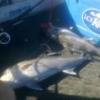The main purpose of this post is to ask the committee if they can do something to really highlight this horrible disease because there are a lot of sick and dying fish out there and the majority of people don't even realise they have hexamita in their tanks.
Since Ive become more alert at noticing Hexamita Ive been seeing over the past several years that the majority of people I encounter keeping "natural" cichlids have hexamita in their tanks, in fact the last 6 hobbyists I have met in the past 3-4 weeks keeping south americans all had hex in their tanks. Its a problem especially people who are keeping central and south americans- its a must that you learn about this disease. I have also seen it get spread by bristlenose catfish which are hard to treat and if you leave them untreated in the tank they will keep reinfecting all the other fish.
I think its already become or becoming a pandemic for 3 main reasons;
1. Its highly contagious.
2. Lack of awareness, most hobbyists dont even notice it infect, sicken and eventually kill their fish.
3. The cure is not easily available, the only cure seems to be metrodonizole which you need a prescription for it, Im only aware of one shop in the whole of WA that sells a form of it (DMZ).
Hexamita is eventually a fatal disease and the fish suffer while they have it, it will stunt growth and they will never show their best colours or be at their full health potential.
Everyone needs to learn the symptoms to look for, especially people keeping things like oscars, pbass, green terrors, and other common central and south americans.
Ive not put all the details about how to cure this disease or the symptoms to look for because Im short on time and theres already a lot of info on the web if you google it, if any members want to do it feel free otherwise please just google hexamita and you will find lots of information and photos of what it looks like and how to treat it.
I hope your club can do something about bringing this terrible disease to peoples attention and help wipe it out of the cichlid hobby.
Cheers
Den
Edited by Den, 24 October 2013 - 10:16 PM.













